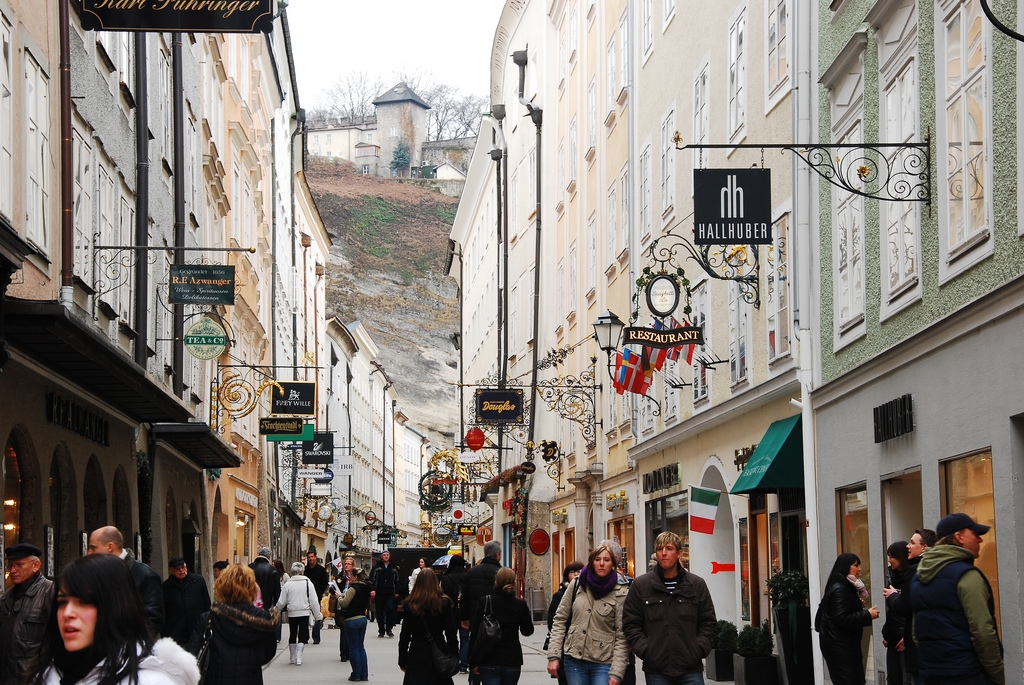The Sound Of Music And Rain In Salzburg

When the airport of a city or town is named after a local but deceased celebrity, upon arrival in said city one can expect a challenge in avoiding the posthumous paraphernalia and celebration of the eponymous home-grown hero.
For example, touching down at Liverpool’s John Lennon airport, one can expect to be inundated in the city center with the numerous seedy joints with by-lines claiming to be “John’s favorite bar,” hotels with names such as “Hard Day’s Night,” and promoters lingering on each street corner with the intention of luring hapless tourists on trips to Penny Lane and Strawberry Fields.
I expected similar scenes upon arrival at Salzburg’s W. A. Mozart Airport. Besides home of the birthplace of Mozart, Salzburg is principally known across the English-speaking world as the home town of the Von Trapp family up to the 1930’s, and subsequently the setting for the sun-drenched film The Sound of Music.
The city is saturated with bobbing teddy Wolfgangs on elastic, and murals of children strapped in Lederhosen singing with a backdrop of bright blue sky; pictures of Christopher Plummer on-set bedeck café walls and one can buy chocolates in the shape of Mozart’s profile on the counter at most newsagents. However, what was apparent to us as we approached the city center was that, as Liverpool is well worth a visit even to people who preferred Mick Jagger to the Fab Four, so Salzburg can be an intriguing destination for those who have no interest in the city’s musical prodigies.
Driving into the city from the airport, once through the suburbs, the pastel coloring of the former merchants’ houses lining the roads start to emerge and above them you can begin to spot the baroque church steeples and domes that rise up from the city. More striking at first glance than the architecture is the hulking Kapuzinerberg that sits in the center of Salzburg; a fully forested hill whose summit at 2, 087 feet is the highest point in the city.
Running at the foot of the Kupuzinerberg is the city’s river, the Salzach, flowing in a luminous, light turquoise color like cloudy mouthwash. Just a few steps down from the street one can perch upon white rocks that sit tumbled on the banks, dipping feet into the glacier cold water and feed plump and indifferent ducks seeds from a fresh Voll Korn Brot.
The Alt Stadt (Old Town) of Salzburg lies between the river and craggy Mönchsburg upon which perches the city’s fortress. The Festung Hohensalzburg is the largest and best-preserved fortress in Europe and provides a striking and imperial backdrop to the city. Construction of the Festung Hohensalzburg began in 1077 by the Archbishop Gebhard, and it was occupied and enlarged by his predecessors who ruled the city autonomously until the end of the 19th Century.
Visitors can walk freely along the undulating paths through the trees that surround the fortress, and within the high walls there are guided tours where one can visit the torture chamber inside and from the Reckturm watchtower enjoy a panoramic view of the city and the misty Alps beyond.
The fortress also offers a great view of the Alt Stadt below — the twisting cobbled alleyways just visible between high rooftops, leading out upon the sprawls of numerous squares each centered with a fountain or statues. In winter these Plätze offer ample space for a variety of Christmas Markets fit with stalls offering steaming, scented Glühwein, caramelized chestnuts and delicate mahogany Baby Jesuses. In the summer the fountains offer a chance to cool down, while old men draw caricatures for children and newlyweds amongst bars with stands with red patio umbrellas serving steins of Heffeweisen and Stiegl.
Alas, when we visited Salzburg in early September, we were greeted by heavy clouds and a prevailing, splattering drizzle. The artists and their paintings were draped in identical transparent smocks, and huddled tourists sheltered under the patio umbrellas with not a beer in sight. Our guidebook told us that summer in Salzburg suffered regular spells of heavy rain, which the locals called Schnürlregen (string rain).
Though heavy, we read that this rain could disperse in a matter of hours when the warm south wind known as the Föhn blew over the city. We convinced ourselves that the Föhn would be here any minute, and so along with hardy groups of Chinese — consistently the most diligent and thorough of all tourists in my experience — we ignored the rain, dismissed the umbrellas and began to climb the steps leading up the Mönschburg.
In the shadow of the great fortress, nestled in the side of the hill, is the Nonnberg Convent, offering visitors a serene and more subdued experience than the grand St Peter’s Abbey and Salzburg cathedral down in the Alt Stadt. Following a path circling the north side of the hill under crumbling archways one can slip through iron gates into an off-kilter and weedy courtyard. Around the corner are the heavy wooden doors leading into the musty convent, where through more iron gates one can peep into confessional booths and rooms carved like grottos for private meditation.
Outside the convent we walked back onto the path to the lip of the hill where a low stone walls runs. At this point the path and wall loop out and back in again, creating a rounded ledge where a spherical tree stands circled by a wooden bench. Here we sat, partially sheltered under the leaves, looking out at the domes and minarets bellow, the ramshackle roofs of the east end of the town and in the distance to the south, the foreboding Untersberg, its great mass just visible through the clouds.
The Untersberg is the highest mountain in the region, and it is over its craggy heights that in The Sound of Music, Captain Von Trapp proposes that he and his family climb, so to escape capture at the hands of the Nazis. One of many irregularities in the film is that fact that if the von Trapps had indeed taken this course, they would not have ended up in Switzerland as the benevolent captain promises, but in Bavaria. Indeed, they may even have stumbled, skipping and yodeling, into the lap of Hitler himself, reclining at his summer chalet in the mountains just beyond the Untersberg.
We didn’t make it as far these mountains but we did take a bus out to the country house Hell Brun. This was the summer residence of a prince of Salzburg, Markus Sittikus. Built between 1613 and 1615, cast in corn yellow and terracotta orange, one can recognize much of the villas of Tuscany in Hell Brun and even in the downpour we could appreciate how splendid this place would look in summer.
Dripping and shivering, we joined a tour group at Hell Brun to see the “trick fountains” built into the gardens by Sittikus so to drench guests who outstayed their welcome. Our jovial guide led us sloshing about the ponds, pools and little gravel paths of the gardens and up to a stone table with four seats on either side and another at the head. Twisting a tap hidden in the bushes, he broke into applause and chuckles — just as, no doubt, Sitticus himself would have done — as jets of water arose from the seats of the stone chairs where the prince’s guests would have sat.
These displays were greeted with half-hearted tittering and forced sounds of approval from us in the group who were afflicted by the effects of the weather a little more than our guide. There was even less congeniality on our part when he took us into a little grotto towards the end of the tour, and after another preamble over Sittikus he stealthily twisted a nozzle concealed in the stone wall and water began gushing out, not from the pit we were gathered around and looking into expectantly, but instead from above our heads and below our feet. Modest Brits flung themselves against stiff Germans as we all attempted to avoid a further drenching as the sound of our guide’s microphoned cackle reverberated about the grotto.
Our tenacity and good cheer had taken a battering at Hell Brun and in a slightly subdued state we returned to the city and took our place in a mini-bus heading out to the lakes that surround Salzburg. Our Italian driver and guide was in as good a spirits as the chap at Hell Brun, and like the latter, he ignored our despondency and instead giggled at the grim weather.
As we reached a vantage point on the road looking over the spectacular Fuschlsee, what should have been a stretching mass of glistening azure, we instead looked out upon drifting clumps of grey fog, through which at points one could spot a darker grey which we assumed must be the hidden lake below.
“Yes, yes, cannot see anything today!,” the Italian brightly commented standing next to us. “Nope. Hahaha. Nothing today!”
On the way back to the city we barely looked out at the impressive Mondsee. Slumbering and sodden, with the tones of Mozart’s Requiem on the minibus stereo, we made plans to find a traditional restaurant that evening, order some Austrian Goulash, sit by a log fire, take off our socks and dry our numb feet.
On vocalizing our plans to our driver, he insisted that he take us to the best Italian restaurant in town. He dropped us off, waved us goodbye and we entered into the restaurant-cum-delicatessen and immediately saw that there was no Ghoulash, certainly no fire, and we were to sit on a table next to a gently vibrating glass counter serving cold meats.
The Föhn came during our last night in Salzburg and we woke up the next morning under blue skies and clear, sparkling sunlight. There was a light mist still hovering over the fields as we rushed down the hill after leaving our hostel, determined to see as much of the city in the sun as possible before catching our bus back to the airport an hour later.
We rushed first to Mirabel Gardens, where accompanied by diligent droves of Chinese tourists — who else? — and amongst the geometrically designed pink flower beds, we took action shots of each of us dancing around the fountain like the Von Trapps singing “Do-Re-Mi,” frolicking in the sun light and dancing on dry feet.
The fantasy of Salzburg in the sun endures in our minds as a wonder only partially tasted. Yet the merit of a town that can appear so peaceful and exciting, when wet and dispirited is a testament to the fact that even those who are not Mozart nuts and cannot yodel to “The Lonely Goatherd,” will find much to appreciate in one of Europe’s finest gems.
Schnürlregen or not, you can have confidence in Salzburg.

[Signs on a Salzburg Street by Joel Bez/Flickr]
 Bertie is an English Literature graduate from London currently living in Berlin. Most of his time is spent reading, drinking and trying to learn German. More of his writing can be found here at BertieDigbyAlexBlog.blogspot.co.uk.
Bertie is an English Literature graduate from London currently living in Berlin. Most of his time is spent reading, drinking and trying to learn German. More of his writing can be found here at BertieDigbyAlexBlog.blogspot.co.uk.
